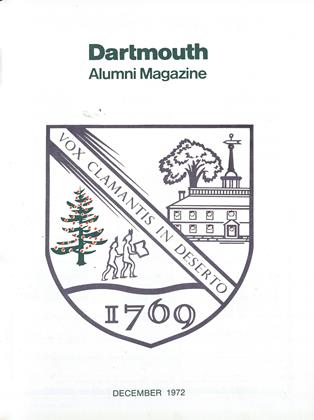To advise him on ways to reduce the rate of growth of the College's net budget, President Kemeny in September announced formation of a Task Force on Budget Priorities. Last month the membership of the task force, chaired by Dean John W. Hennessey Jr. of Tuck School, was made known.
Faculty members, representing the three divisions plus interdepartmental studies, are Peter A. Bien, Professor of English; Louis Morton, Daniel Webster Professor of History; Melvin Spiegel, Professor of Biology; and Brunetta R. Wolfman, Assistant Professor of Urban Studies.
Students on the committee are Robert S. Bachelder '73, Middletown, N.Y.; Michael R. Cornelius '75, Vienna, Va.; Victor F. Zonana '76, Brooklyn, N.Y.; and Ned W. Dearborn, second-year Tuck student.
Gerald Cullen, business officer of the Dartmouth Libraries, represents the College staff on the task force, and E. Ronan Campion '55 of Hanover is the Alumni Council's representative.
Ex-officio members are George H. Colton '35, Vice President of the College; Prof. Donald L. Kreider, Vice President and Dean for Student Affairs; Rodney A. Morgan '44, Vice President for Administration and Acting Treasurer of the College; Prof. Leonard M. Rieser '44, Vice President and Dean of the Faculty of Arts and Sciences; Dr. Carleton B. Chapman, Vice President and Dean of the Medical School; Prof. Carl F. Long, Dean of Thayer School; and Dean Hennessey of Tuck School, who heads the 17-member study group.
The task force was established by President Kemeny as a counseling body representing all elements of the College to advise him in carrying out instructions from the Dartmouth Trustees to slow the rate of expansion of the net budget by one per cent—from an annual increase of six per cent to five per cent.
He has asked the task force to make a careful study of the financial situation of the College and then to present a set of recommendations to him as to how the Trustees' "guidelines can be met without compromising the quality of education at Dartmouth College."
"Specifically," he said, "the charge of the task force is not limited to a question of how 'cuts' can be made but concerns the overall strategy for the best use of our limited resources. For example, the task force may wish to recommend a more drastic slow-down in some areas to allow the launching of new educational initiatives. Equally important will be recommendations as to what items should receive highest priority in the continuing fund-raising efforts of the College."
He asked that the task force report back to him by March so that he and the vice presidents of the College could review the recommendations and present a plan for action to the April meeting of the Board of Trustees. He also asked that members "serve as individuals and not as representatives of special interest groups." Unless the overall interests of Dartmouth College are put first, he stressed, the mandate of the task force cannot be carried out.
 View Full Issue
View Full Issue
More From This Issue
-
 Feature
FeatureThe U.S.-Canadian Relationship
December 1972 By JOHN SLOAN DICKEY '29 -
 Feature
FeatureEgyptologist
December 1972 By MARY ROSS -
 Feature
FeatureHall of Hallmark
December 1972 -
 Feature
FeatureClub Officers Hold Annual Meeting
December 1972 -
 Feature
FeatureRugby Posts A Winning Fall Season
December 1972 By TREVOR O'NEILL '73 -
 Article
ArticleFaculty
December 1972 By ROBERT B. GRAHAM '40







